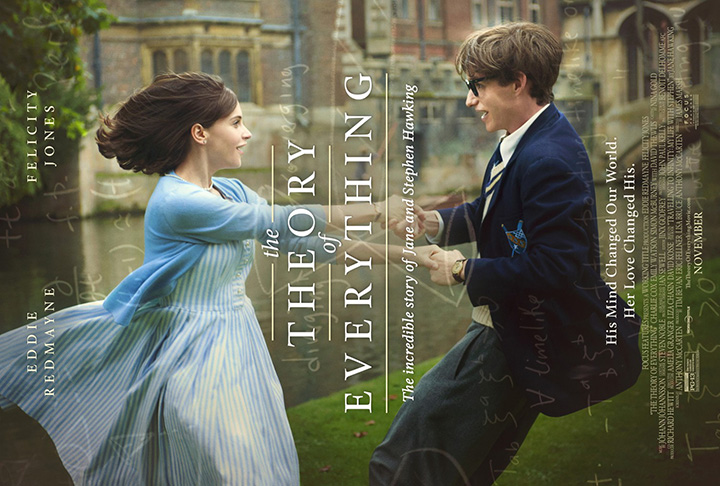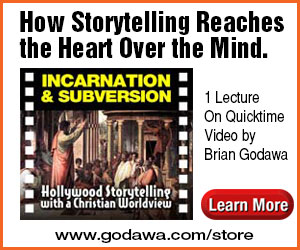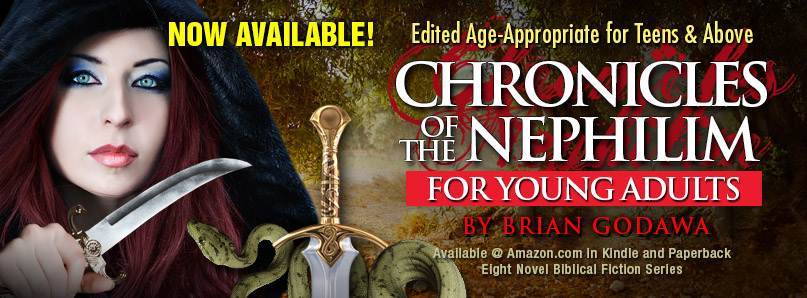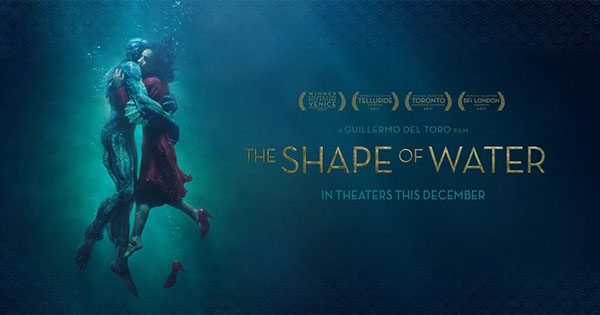
The story of brilliant Cambridge cosmologist Stephen Hawking and his relationship with his wife Jane Hawking, based on her book, Travelling to Infinity: My Life with Stephen.
If Eddie Redmayne does not win the Oscar for his portrayal of famed scientist Stephen Hawking, it will be a proof for the existence of Satan.
Hawking is as universally famous for his Quantum physics as for the debilitating disease that froze his body into a prison. This movie does a masterful job of capturing the heart wrenching decline of Hawking’s physical capacities that began in his college years at Cambridge. You cannot watch his transformation from a young idle but brilliant young man into the twisted frozen cripple without having your heart deeply moved by the pathos and irony of such misfortune.
But this movie is also a love story that embodies the additional irony of an uneasy relationship between faith and reason in our secular age. Felicity Jones is fabulous with nuance as Jane Wilde Hawking, who meets Stephen in college and falls in love with him just before his diagnosis of ALS, the disease of the baseball hero, Lou Gehrig. It cripples the body, but leaves the mind untouched.
What makes this story so fascinating is that Jane is an Anglican Christian while Stephen is an atheist. When Jane first finds out that Stephen is a “cosmologist,” he explains it is like “religion for intelligent atheists.” She asks him “what do you worship?” and he replies, “One single equation that explains the universe.” This motivation, which sounds suspiciously like a God substitute, becomes the Bethlehem Star for Hawking’s life journey as a mathematician who “can’t allow his equations to be muddled by a supernatural creator.”
 But Jane is no simple-minded pushover in her spiritual beliefs. She retorts with a feistiness that she carries through the film, “That seems less an argument against God than against physicists,” and thus their stormy relationship of passionate strange attraction that gives Stephen motive to live, and the spiritual repulsion that drove them apart. (In one point of the movie, they look up at the stars and Jane quotes Genesis One. But she doesn’t say, “In the beginning God created the heavens and the earth,” rather, she says, “In the beginning was the heavens and the earth…” Which is revealing of the filmmaker’s bias in not wanting to give God too much screen time.)
But Jane is no simple-minded pushover in her spiritual beliefs. She retorts with a feistiness that she carries through the film, “That seems less an argument against God than against physicists,” and thus their stormy relationship of passionate strange attraction that gives Stephen motive to live, and the spiritual repulsion that drove them apart. (In one point of the movie, they look up at the stars and Jane quotes Genesis One. But she doesn’t say, “In the beginning God created the heavens and the earth,” rather, she says, “In the beginning was the heavens and the earth…” Which is revealing of the filmmaker’s bias in not wanting to give God too much screen time.)
The strain on their relationship develops when Stephen is incapable of helping Jane with family duties, He withdraws into his physics work as she raises their (ultimately three) children. He lives in denial of his disease because he refuses to be defined by it. He avoids using a wheelchair, keeps using the stairs by crawling up and sliding down, and worst of all, denies Jane the full time help she needs to take care of him. This character flaw in Hawking has the result of incarnating a paradigm for the triumph of the human spirit in the face of great adversity. An imprisoned body cannot keep the self-determined mind from flying to heights of grandeur.
The problem is that what the filmmakers seek to depict as a victory of boundless humanity over the boundaries of life actually becomes an unwitting tragedy of the self-delusion of mankind without God. As much as Hawking denies his limitations, he hurts the one who loved him most. He ultimately has to accept a wheelchair, can no longer climb the stairs and gives in to having full time help. Why? Because reality will always crush human pride and force us into submission whether we like it or not. (We. Will. All. Die.)
And that leads to the second tragic element of this story. The new help is a man who begins with genuine concern to help Stephen, but inevitably falls in love with Jane. And one can certainly understand the overwhelming temptation of having a “normal” relationship with a healthy equal under such strain. Jane and her reluctant lover manage to fight their baser instincts our of their moral convictions and apparently do not give in to temptation.
Jane’s own moral striving over the flesh is contrasted with Stephen’s selfish absorption. But the dark matter between them leads to Stephen’s own adulterous betrayal of Jane with one of his later female helpers. We see a twisted kind of loving control the new caretaker has with Stephen that draws him away from the one woman who truly loved him and sought his well being for 30 years. The mind is not the only thing that can overcome physical limitations, so can human pride.
But the real tragedy of this story is not so much in the physical captivity of a great mind, or the degeneration of love and marriage, as much as it is in the spiritual captivity of a mind in denial of reality. Again, this is not the intent of the filmmakers, but rather the inescapable deconstruction of their own godless theme.
At the end of the film, in an atheist sermon quite similar to Carl Sagan’s Pale Blue Dot foolishness, Hawking says to a crowd at the end of the film, “It is clear we are ordinary primates on a planet orbiting an average star in the outer suburb of one among a hundred million galaxies. but ever since the dawn of civilization, people have sought for understanding to the underlying order of the world. There ought to be something special about boundary conditions of the universe. And what can be more special than that there is no boundary? There should be no boundary to human endeavor. No matter how bad life seems, there is always something you can do and succeed at. While there is life, there is hope.”
No boundaries, huh? Exactly what scientific observation or mathematical formula gives the physicist that idea? That may be a nice humanistic slogan of inspiration but it is deeply scientifically false and lethal to finding that simple equation for salvation. For our boundaries are so intrinsic to our existence that denying them is self-delusion. We are all going to degenerate and die. That’s a boundary condition that is scientifically irrefutable and inescapable (despite the sci-fi fantasy of transhumanists). We are contingent finite beings in a contingent finite universe—also a scientific fact.
If there are no boundaries, then physicist, heal thyself.
Or should I say, physicist, create thyself.
Ever since the Tower of Babel, Homo Ignoramus Rebellious has sought to “make a name for ourselves” by building our towers of self-deification. We don’t want to be accountable to a Creator, so we deny our own limitations and boundary conditions and in flying leaps of irrational delusion, conclude we are without limits. We can become as gods. Well, if you deny the central point of rationality, the Judeo-Christian God, it makes sense that you will replace him with an idol of yourself. The insanity of Original Sin.
It is in understanding the boundaries and learning how to let them guide you to the truth wherein real freedom lays.
Einstein once said that scientists are poor philosophers and he was right. Like Hawking, they call for the “end of philosophy and religion,” with their pseudo-science, while they make speculations that they themselves do not even realize are not scientific but philosophical and religious speculation.
One can claim that the universe is infinite, but in order to do so, one must be a science denier. To posit that everything came from nothing is anti-science. To posit that life came from non-life is anti-science. To posit a multi-verse of infinite universes is pure philosophical speculation without empirical support. It amounts to a religion created to salve the wound of the self-referential absurdity of atheism. Atheist scientific speculators like Hawking are merely creating their own religion in the name of physics—but make no mistake, it is religion and philosophy, not science.
The summary of Hawking’s life is sadly an incorrigible denial of the scientific and logical implications of his own pursuit of the origin and meaning of the universe: A Creator. He will not bow the knee to the higher power, so he makes up a fairy tale of a philosophically and scientifically absurd self-creating universe in order to justify his pre-determined philosophical conclusion, “What need for a creator?” “No boundaries, no beginning, no creator.”
At one point in the film, we hear the line from Hawking’s hit book, A Brief History of Time, about the hope that when we know the simple equation, we will “know the mind of God.” Jane mistakenly thinks that this is some kind of concession to the possibility of a God, but she misses the point. In context of that book, Hawking was redefining God out of existence by using “mind of God” as a euphemism for the impersonal mathematical equation that supposedly upholds and runs the universe (And they say Christians believe silly things). His intention is to say, call it God, if you want, but it’s ultimately an impersonal force (Always add after such statements: “And I am not accountable to it for my moral behavior” and you will understand the true origins of the black hole of human nature).

I have no desire to make light of Hawking’s brilliance or of his suffering in this world. To the contrary, as I watched this movie, I was profoundly moved. I wept at his suffering and the suffering he caused his wife and family. I could not help but think of how the mind untethered by God results in a captivity that is far more wretched than the degeneration of the body, indeed the universe. It moves one to posit absurdities of one’s own grandeur and the denial of the logical consequences of meaninglessness in an atheist universe. It drives silly tiny man to shake his trembling cramped fist at his Almighty Creator. “No boundaries! No beginning! No creator!”
After all, if we are really as meaningless and insignificant as Hawking concludes, then it is self-delusion to conclude with the absurd non-sequitur, “If there is life, there is hope.” There is no hope in such a case, there is only death and nothingness to look forward to. You can’t create meaning out of nothing.
Unless you live in denial of reality.
I finally got a glimpse of understanding of the beauty of the promise of resurrection in Hawking’s own misfortune of captivity. Here is a man who Jesus offers true hope, not false humanistic hope, of truly having final triumph over all the boundaries of life and death. How I longed to see this man rise up at the Resurrection of the Dead and become whole in mind, body and soul. In a way, he is a metaphor for us all, captive in our twisted pride and denial, seeking freedom everywhere but in the only one who can free us from our own self-delusion of “no boundaries, no beginning, no creator.”
These words of Jesus came alive to me with hope in the face of deep sadness:
Luke 4:18–44
Jesus quoted the prophet Isaiah saying, “The Spirit of the Lord is upon me, because he has anointed me to proclaim good news to the poor. He has sent me to proclaim liberty to the captives and recovering of sight to the blind, to set at liberty those who are oppressed, to proclaim the year of the Lord’s favor.”





